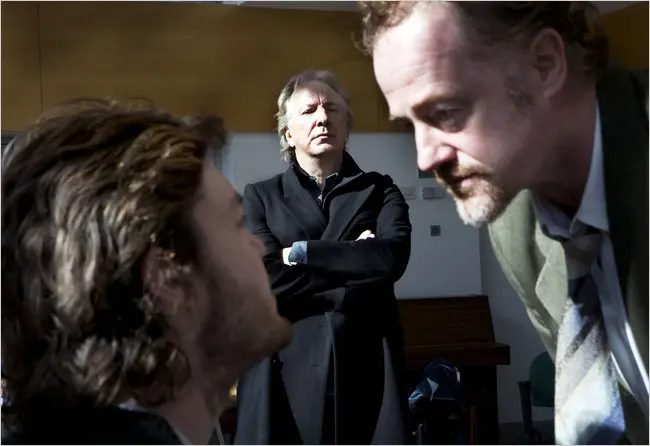Mapping the Dark Heart of Strindberg
BY Sarah Lyall April 7, 2010
LONDON
PREPARING to direct “Creditors”, Strindberg’s bruising evocation of betrayal, hurt and revenge, the actor and director Alan Rickman turned to advice he was given when he played a heartsick suitor in Ang Lee’s film version of “Sense and Sensibility” years ago.
The advice more like an order, really was to stop Acting with a capital A.
“It goes back to doing less,” Mr. Rickman recalled. “Ang Lee is wonderful to work with, but his English is a little well, it wasn’t his first language. He gave us these notes. Mine was, after one scene, ‘Alan, be more subtle do more.’ By which he meant, do more of the subtle stuff.”
He spoke while absent-mindedly nibbling a sandwich at the Tricycle Theater here, where rehearsals for “Creditors” were about to begin. It was something of a shock to realize that his familiar on-screen drawl, that languorous way he has of talking, like a lion’s lazy swipe of the claw, is the voice he uses in real conversation.
It matched his mood, urgency disguised as sleepiness. In his seemingly patient way he was deeply impatient to start work on “Creditors”, which ran in the autumn of 2008 at the Donmar Warehouse in London and is to open again at the Brooklyn Academy of Music on Friday. But Mr. Rickman, who is known mostly as an actor despite several acclaimed turns as a film and theater director, was less eager to discuss his own career.
Not that it is bereft of interesting developments. The day before, for example, Mr. Rickman, 64, had just finished filming the final “Harry Potter” movie. His portrayal of the slithery and surprising Severus Snape has brought him fame as never before, making him into one of the world’s most celebrated movie villains, a thrilling antihero to the Potter-mad masses.
But in his own mind Mr. Rickman had merely jumped from one intense experience to another, and he was thoroughly focused on “Creditors”. “Three characters dragged through a hedge backwards in 90 minutes,” is how he described the play, and he is not kidding. It is an emotional pepper grinder, a punishing psychological enterprise for cast as much as audience.
All the more reason, he said, for the actors to do more by doing less.
“More and more I believe that great acting is about truly listening to what the other person is saying and then truly answering,” he said. “Once you start doing that, which these three do magnificently, then it becomes utterly compulsive. You cannot wait to hear what is going to come out of their mouths next.”
The debts here are emotional. The play depicts a toxic triangle of love, hate, revenge, regret, despair, fury; you name the extreme feeling, “Creditors” has it. Its three characters: Adolph (Tom Burke), a sickly and sensitive artist; Tekla (Anna Chancellor), his much older wife; and Gustav (Owen Teale), a mysterious, insinuating stranger with compromised ulterior motives meet in pairs, never all at once, as power ebbs and flows among them.
British critics found the emotional extremes believable and compelling. Charles Spencer, writing in The Daily Telegraph, said the production was “gripping, powerful and blackly comic,” while in The Times of London, Benedict Nightingale said: “Rickman’s revival isn’t only well acted. It isn’t only forceful, riveting stuff. It’s as balanced a picture of gender warfare as Strindberg was capable of producing.”
“Creditors” is not one of Strindberg’s best-known works, which came as something of a surprise to the Scottish playwright David Greig, who wrote the adaptation. “It seemed to me it was a beautifully structured, funny but also intense fight between two men and a woman in real time,” he said in a telephone interview. “I also thought it was incredibly modern.”
If Strindberg’s Norwegian contemporary Henrik Ibsen was the ego, conscious of taking a stand on the great questions of the day, then Strindberg was the unfiltered id, Mr. Greig said.
“He’s a primal, vital, raging spirit,” Mr. Greig said. “He doesn’t have protective armor. He doesn’t come across as a writer with a conscious mind trying to construct an argument. He can’t stop himself just throwing his unconscious at the stage in all its nakedness.”
Strindberg’s difficult relationships with women, especially his three wives (he called one “the vampire”) can express themselves as misogyny in his work, presenting a problem for directors and actors. Here Tekla is presented as something of a vampire herself, at least in the others’ accounts.
But the actors in “Creditors” say there is more to it. For one thing, Mr. Burke said, the characters form an endless triangle of complicity. “They all feed off each other’s energy and sap each other,” he said. “They’re so much a part of each other. All three together make a portrait of a vampire.”
Tekla is more than a caricature. Complicated and contradictory, coquettish and manipulative, she shows charisma, humor and spirit, not least in rebelling against society’s stifling mores in late-19th-century Sweden.
“I think Strindberg is honest about male misogyny, his own included,” Mr. Greig said. “I mean misogyny in a primal sense, not a kind of tawdry sexism but the male fear of female power and potential.”
Ms. Chancellor said the play sheds light on the strange phenomenon by which people can almost reinvent themselves from one relationship to another.
“In one relationship you can have the upper hand and be carefree or dominant, and in another relationship you can be terribly insecure,” she said. Laughing, she said of Strindberg, “He understands this with the clarity, the sort of scary mad insight of a madman.”
The play’s uncomfortable truths including “the basic deep hurt of being left and having to deal with that,” as Mr. Teale put it seem to form a kind of Rorschach test for audiences, who tend to respond according to their own experiences and prejudices.
“When people watch it, they first laugh out loud at the absurdity of it,” Ms. Chancellor said, “and then there’s a rather scary silence as they look more into themselves, thinking, ‘Have I ever, in my own way, been as misogynistic, been as vicious, been as scared, been as vulnerable as he is depicting these people?’ ”
With all those passions flying around in an evening that moves relentlessly along without intermission, Mr. Rickman describes himself, rather self-effacingly, as the play’s “emotional traffic cop.”
“They’re absolutely free to drive the car, but you can see where, for instance, the steering might have been a bit better,” he said. “It’s very finely calibrated, the writing and the emotional geography of the play. Things change in it. It’s full of hairpin bends, and you’ll be off the road if you don’t turn in the right way around the corner.”
He added: “I certainly wasn’t telling them how to act. Hopefully, I was telling them not to act.”
Which sounds relaxing, hands-off, almost laissez-faire, a thought reinforced again by that singular voice. To the actors, though, being directed by the languid Mr. Rickman is akin to being “stripped raw,” as Mr. Teale put it.
“He’s exacting,” Ms. Chancellor said. “He won’t allow for you to show off. He chose you because there’s something in you that he wants to see, and he will be quite ruthless about seeing that. He’s not going to let you off if he feels that you are hiding.”
Mr. Teale said: “It’s hard because you think, ‘I’m doing it; now I’m getting somewhere,’ only for Alan to say: ‘No, no, no, no. You can’t fool me.’ ”



